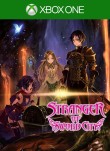
A long time ago, close to 30 years I played a game called Phantasy Star for the Sega Master System. A marvel of its time, its sprawling dungeons, delightful npcs and tough enemies made for a fantastic experience that most RPGs have had a hard time duplicating to this very day. It’s 2016, and Experience Inc has put out a game called Stranger of Sword City, an English port of a Japanese Xbox 360 RPG game. From the very first set of screens, it is evident that this game has one foot firmly set in the RPG past but also introducing a few new features to help keep it fresh and new for the future. Hopefully these feet are all in the right places.
March 22nd, 2016 update – Updated the achievement notes.
Information
Game Rating: Teen
Size: 3.05 GB
Release date: 3/22/2016
Developer: Experience Inc
Publisher: Experience Inc
The story starts in the middle of a late breaking news report. Your character is aboard a passenger aircraft when it suddenly disappears. Rather than finding yourself among the wreckage, you instead find yourself alone in a dungeon surrounded by nothingness. A strange old man comes out of nowhere and beckons you to follow him. For some reason, you decide to do just that. One tale after another unfolds…but it always comes back to Sword City.
Graphics
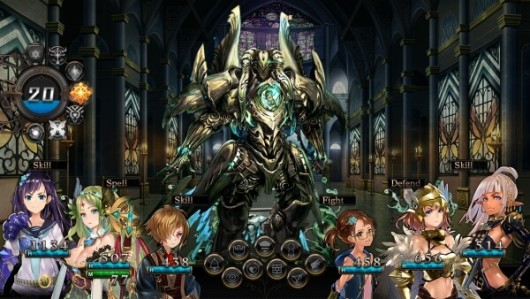
The game is a first person dungeon crawler. The world you move around in is three dimensional but the icons, characters, enemies, etc are all two dimensional. It is certainly akin to those style of games you played 15-20 years ago but they did pretty it up some for the Xbox One. One of the ways they brought it up to code was through the use of art styles.
When Experience Inc decided to bring this game over to the states they decided to adopt two different art styles for the characters as well as the monsters. These two art styles were developed by Yoko Tsukamoto (who worked on Xenoblade Chronicles X) and Oxijiyen (who worked on Operation Abyss: New Tokyo Legacy). The nice thing is that you can switch back and forth between these styles to see which you like best. Honestly, I’m split between the two styles and try to switch back and forth. One thing to watch out for was that some of the portraits mirror actual npcs in the game (these are usual contained in the first page). I accidentally created a dwarf knight who had the same picture as the shopkeeper. You would think I get a discount at least for the uncanny portrayal.
Sound
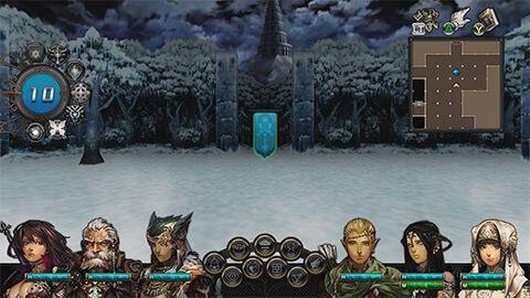
As you emerge from the dungeon the first time, you are introduced to what can only be described as completely immersive. The environment noises make it seem like it is a very desolate landscape and that finding the next lineage type is neither far away nor close. It feels unknown and it takes on an eerie quality after a couple of minutes. Maybe I should move cautiously forward, maybe I should head back to Sword City, maybe I should drink a tall lager (sorry, that’s the dwarf talking).
However once the battle starts up, it becomes a whirlwind of frantic music, desperate for well placed actions. The music is up beat, it will play in your head several days and then you’ll be humming it while you eat mashed potatoes while your wife looks curiously on. It is also highly unfortunate that the PS Vita gets a Limited Edition with a 2 disc soundtrack for players to enjoy but that’s one of the pitfalls with digital copies.
It should also be mentioned that you will be reading subtitles for the entire game unless you understand Japanese. The Japanese in the game is voice acted very well from what I could tell. As there is unfortunately an insane amount of text to go through, it would have probably been very cost in-effective to re-record all of the lines in English. It is understandable and does not detract from the experience.
Gameplay
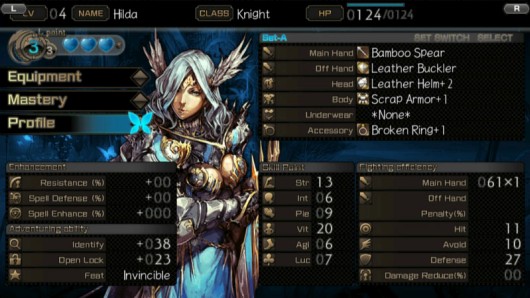
As mentioned from the onset, your character is thrown in a dungeon and the game actually progresses from one dungeon to another as you defeat monsters, collect treasure and attempt to find what is known as lineage types (think boss battles). All movement is three dimensional/first person combat whether it is in a dungeon or outside those dungeons, it will feel the same. The movement and gameplay is right out of Phantasy Star or Wizardry. If you do find yourself in Sword City, then everything is handled by a menu system regardless if you are creating & managing characters, buying/selling, or giving over those blood crystals (from lineage types) to the appropriate vessel to fill out your skills tree.
The character you choose is also given five teammates to play with. These characters are entirely customizable or can be picked from an existing roster. There are many different classes including the usual fighter, knight, cleric, and wizard. But there are not so common ones like Samurai (think one-hit kill specialist), Ranger (archer at large) and then the completely new to me, Dancer class. No, the Dancer class does not cast a large pole on the battlefield and starts asking for 20 goldpieces…rather they play into an aspect called Morale and typically shoot poisonous darts and other thrown objects. Think of them as a jester (though you can think of them the other non PG way too if that helps).
The classes also have races such as dwarves, elves and humans. These characters must be managed carefully and age even plays a factor as you only have so many life points before the character is toast for the rest of your playthrough. It is important to mention that you can spend a lot of gametime recovering that character’s lifepoints or spending a lot of coin to get them back. However, thankfully the character doesn’t actually age, and reloading a save is easily done as long as you don’t mind doing a little back and forth to get back to the desired point.
There are also some rather new ideas (or at least new to me) when it comes to the classic dungeon scrolling rpg that they have placed in here. One was mentioned above which was Morale. Morale has some nice abilities attached to it like a 100% escape plan or healing your allies a little bit each turn. It also taps into a skill called Hide where you can hide on a specific section of the map to ambush mini-boss type characters who also have better than average treasure (which is scarce in this game).
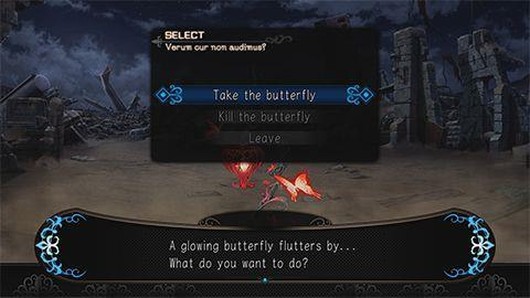
There are also creatures known as Butterflies which you can decide to kill (for more loot) or take on a ride back to the city. Since unique items are extremely hard to find and it can be very depressing to find one with crappy stats, there is also what is known as a Mumic (or Mimic for the D&D fans) which will eat unique items and then redistribute it in the world to find it again at hopefully better stats.
Of course, there is a mini-map feature which gets filled in as you explore each of the dungeons and over-worlds. Once those get filled in, we then can lay witness to a not so common feature in these type of games, the auto move. Pick your point and then confirm the auto-move and your party will move there by itself. Along the way, you will still run into random battles and certain stages (Mausoleum of Forests for one) that won’t allow you to auto move everywhere but it is still incredibly useful. Since the game is very demanding and often you find yourself trekking out a square of land only to run back to the city because you got ambushed, it makes auto-move a necessity to keep your sanity.
Other automatic features are added to the battle screen as well where you can do what is known as “Fast Apply” where your chosen actions are carried out automatically rather than waiting for one character or enemy to strike at a time. Furthermore, if you like those string of commands so much, you can reapply them to make your experience that much quicker. However, be careful with this later option as not paying attention to how the creatures are hitting you and the party will die a quick and violent death.
Speaking of difficulty, this game does appeal to its core audience of fans and is not exactly for the beginner RPG player (even in the “beginner mode”). The game will typically start off your character at level 1 like most RPGs but the enemies start off at level 6 or 7. It is not uncommon when you are training in the Mausoleum of Metal to find a random battle with some kind of fairy that’s level 18. Furthermore, the training mode while helpful to show some of the game’s more obvious aspects like Traps and Hiding tends to be confusing of where to go exactly or how to fight effectively. This is the kind of the thing the player will need to do on its own with a lot of patience and the dreaded trial and error.
The save system or the singular save-point will also frustrate a lot of players as well. You get one save point, the Sword City itself (or more specifically the Strangers’ Guild). You can’t save mid-dungeon, you can’t even save in the overworld before you get to a dungeon. It’s Sword City and that’s it. It becomes a system of timid exploration and then running back to the city or a magical stone (which sends you back to the City). There are also Butterfly wings you can buy which will also transport you back to the city but those cost 2,000 a pop. Which would be great except having 2,000 coin just sitting around is basically unheard of, especially at first.
Replay
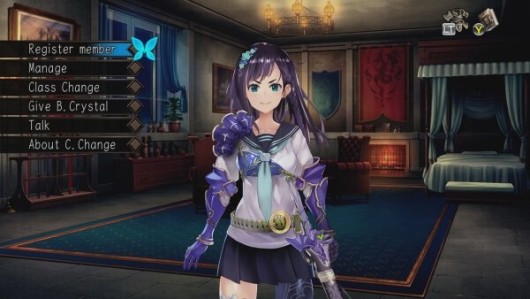
The game itself will take roughly about 40 hours to complete per reports and that is probably being generous. I cannot emphasize enough that this is a tough game and requires patience, skill and a little luck too (when it comes to random battles). Most players unless they give up will get their money’s worth easily despite the $40 price tag (or $30 if they happened to pre-order through Xbox Live).
March 22nd, 2016 Update – The achievement list landed today (first day of release) and actually I have to retract some of what I said on the particulars. There are actually 40 achievements (for 1,000 points) and 22 of them are still secret. As explained previously, those achievements are story related in nature as to not spoil things. Once you are able to get through the story, there does not appear to be anything all that secretive to be frankly honest.
The other 18 achievements are basic collection/milestone type achievements. There are ones for types of items all the way from Class E to Class S (better than A), and there are ones to find certain legendary Katanas (assuming they would then be equipped by your Samurai). There are also multiple achievements related to Hiding (since this is perhaps the most important thing you will do in the game), and ones related to Butterflies and Mumics. Even though the list is slightly different than the Japanese 360 list, there is nothing on here that good players won’t be able to take care of.
Summary
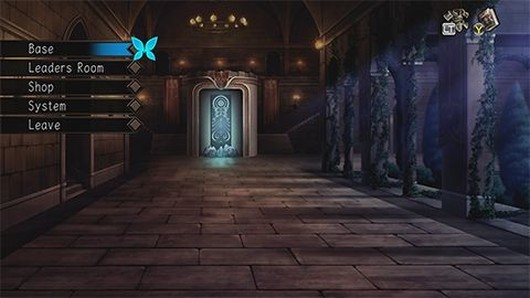
I know I have said it before, but this is the very definition of a Japanese styled dungeon role playing game. From the random battles to the character management to scantily clad females with cat’s ears (Meow…) asking you to save them from the end of the world, it’s the kind of game that most of us role playing aficionados have been waiting for on the Xbox One. It is a brutal, difficult game and not for the players who are used to steam rolling through the typical Western RPG. But yet, there is something so satisfying to performing a successful hide and then gaining two sorely needed pieces of armor that it invites you to keep playing. Recommended.
Disclaimer: The reviewer received a free digital copy of the game from the publisher. He played it for nearly ten hours which included re-rolling his characters about a hundred times, getting stuck in the Mausoleum of Forests a hundred times more, killing sprites and really disgusting creatures with scary nipples, and re-loading my characters from a prior save (because Ievel 18 fairies hit hard) at least 3-4 times. He also managed to gain 7 of 40 achievements.
| Graphics: |  (7.0 / 10) (7.0 / 10) |
| Sound: |  (7.0 / 10) (7.0 / 10) |
| Gameplay: |  (8.5 / 10) (8.5 / 10) |
| Replay: |  (7.0 / 10) (7.0 / 10) |
| Overall: |  (7.5 / 10) (7.5 / 10) |








